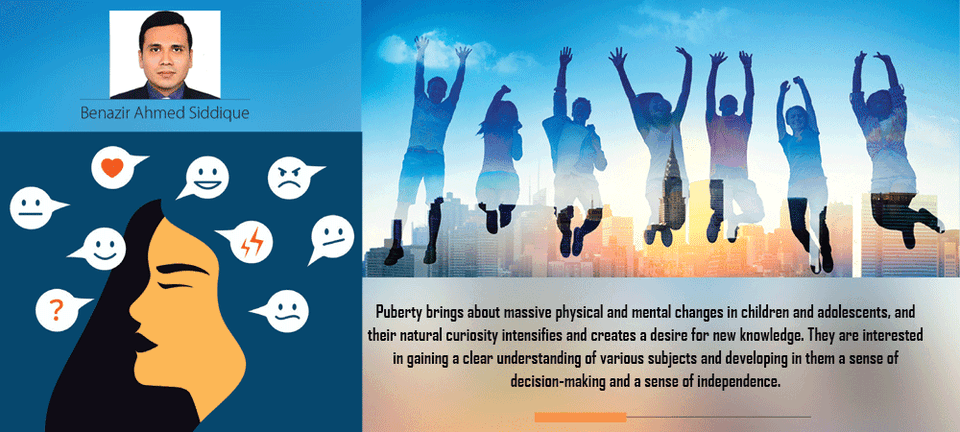- Saturday, 2 August 2025
Physical, Mental Changes In Adolescents
When a child moves towards adulthood and undergoes certain physical and psychological developments and changes, it is called adolescence. Puberty transitions bring about certain hormonal changes in a child that manifest through physical and mental changes. At this time, they cannot even be called children, and many are not even considered adults. At this time, some hormones are produced in the human body, which cause this change along with the blood. The period from 10 to 20 years is identified as adolescence. And after adulthood, this period of adolescence ends. Human puberty and changes are rarely discussed in society or within families.
Hormonal changes during adolescence have particular effects on brain maturation and behavior. This change brings about changes in the person's thinking, perception, motivation, and behavior, which activate and accelerate his reproductive process. This period of puberty affects human body structure and intellectual development by disrupting hormones.
Reproductive Health
Adolescence and reproductive health are interrelated. According to the World Health Organization, reproductive health is a state of complete physical, mental, and social well-being. It is not the effect of any disease or disability in body structure, function, or process. Along with the physical and mental changes of adolescent children, their behavioural changes are also noticeable.
These changes may sometimes seem abnormal. Changes in children include rapid height and weight gain, changes in the skin, the eruption of all permanent teeth, increased sweating, the narrowing of the waist, the growth of large bones, changes in the reproductive organs, the breaking and heaviness of the voice, the widening of the chest and shoulders, etc. This change begins as a process in the central nervous system.
At puberty, the hypothalamus part of the brain begins to secrete the NRH hormone. The outer part of the pituitary gland begins to work, and the hormones LH and FSH begin to be secreted and flow through the blood. Under the influence of LH and FSH hormones, the ovaries and spermatozoa start functioning, respectively. Along with that, they start producing estradiol and testosterone, respectively. Due to the increase in estradiol and testosterone in the body, the pubertal characteristics of girls and boys begin to appear.
During puberty, a child's body transforms into an adult human body in a specific process and acquires reproductive capacity. As a result of their mental and intellectual development with this change, adolescents are involved in social activities at this time. Interpersonal communication increases. At this time, both boys and girls start to behave maturely.
Overcoming the dependence of childhood, they rush towards self-reliance. They don't like the extravagance of their parents. Likes to rely on individual freedom. It is dependent on the ability and skills of the individual who is interested in others and wishes to advance by selecting a field of study.At this time, they want to behave socially responsible. Apart from this, good and bad, right and wrong, i.e., morals, are born among teenagers.
It appears that puberty brings about massive physical and mental changes in children and adolescents, and their natural curiosity intensifies and creates a desire for new knowledge. They are interested in gaining a clear understanding of various subjects and developing in them a sense of decision-making and a sense of independence. Emotions such as anger, fear, anxiety, affection, love, hate, jealousy, etc. are observed directly and indirectly during adolescence.
At this time, there is intensity in the expression of emotions. Sometimes there is no emotion at all. At this age, emotional issues like friendship, anger, fear, apprehension, and conflict, abstract concept-centered behavior, introversion and self-centeredness, ideal formation, intensity of response, sexual passion, suppression of emotions, and joy, etc. are revealed in them. As the review shows, children and adolescents go through an extensive psychosocial transition in the process of transitioning from adolescence to adulthood.
Necessary Nutrient
In this case, every family, school, and workplace should look at these changes and behaviours with a positive attitude and should always treat them in a friendly manner, so that they can openly share their conflicts or new feelings with their parents or close relatives as friends. Along with the development of their intelligence, the provision of necessary nutrients will help them grow properly.
According to nutritionists, the role of a balanced diet during adolescence is very important. Vitamins, sugar, meat, fat, salt, and water in the food list—these 6 elements are essential. Adolescents should have 2,200 calories in their daily diet. Fatty acids are very important for them. It is necessary to drink 2-3 litres of water daily. Bottled water is beneficial. Soft drinks should be avoided, and tea and coffee should be consumed in moderation.
Today's teenagers are our next generation. Their physical and mental growth and intellectual development are closely related to ours. Reproductive health and the psychophysical phase of adolescence are extremely important. Awareness should be created to deal with the mental problems that arise at this time.
Physical Changes
Physical changes are a normal process and should be treated accordingly. Because both men and women have responsibilities and duties in the reproductive process. They should also be aware of reducing health risks. Public awareness should be raised to meet nutritional needs at this time.
Then the future generation will have a healthy mother and a healthy father. In cases of behavioural problems, counseling, reading books, and psychiatrists' opinions can often be sought. Remember that the development of intelligence during adolescence makes a special contribution to creativity.
Parents should take care that the child's development is not hindered or they are not led astray. Parents should be careful when using technology at this time. Healthy reproductive health and the development of adolescent creativity will propel us into a better nation. And for that, we just need awareness, attention, care, and a tolerant attitude towards them.
(Siddique is a freelance writer and social activist)

















